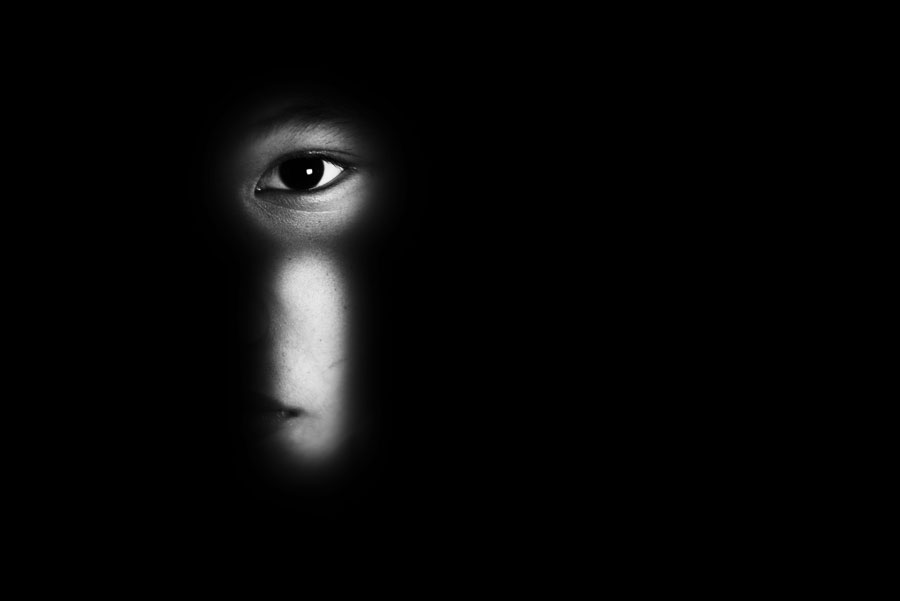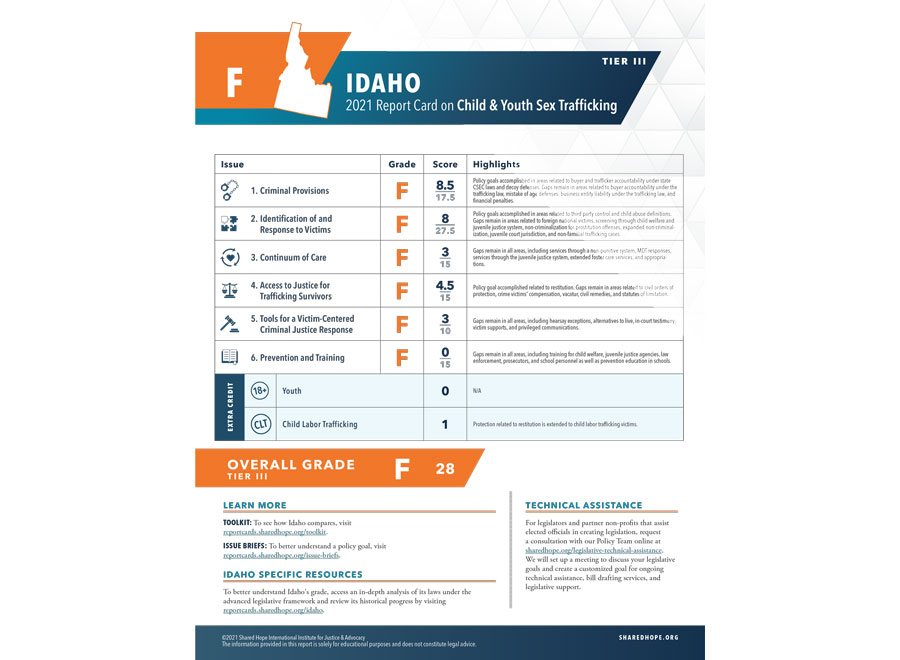Report: Idaho is failing to protect victims of child sex trafficking
Published at | Updated at
BOISE — In an annual report card grading state legislation in place designed to protect the victims of child sex trafficking, Idaho received 28 out of 100 possible points — an F.
Shared Hope International, a Vancouver, Washington-based organization focused on the eradication of sexual slavery, has been grading all 50 states and Washington, D.C., based on anti-sex trafficking legislation for 11 years. The framework of the grading system was altered this year to focus on the identification and treatment of child and youth sex-trafficking victims — rather than the identification and criminalization of their potential buyers and sellers.
Because of the change, representatives of the organization were expecting grades to be lower than in recent years. But Idaho’s failing 28% score is better than just two states — Arizona at 24.5% and Alaska at 21% — the worst in the nation. Compounding the issue, Idaho is one of few states that have provided no response to the report card from government representatives.
According to Shared Hope spokeswoman Sarah Bendtsen Diédhiou, Idaho lacks a “mechanism to identify and provide comprehensive services” to the victims of child and youth sex trafficking.
“There isn’t even that basic foundation in place to protect kids from criminalization and to provide a pathway to services,” she told EastIdahoNews.com. “Almost half the country has a system of laws that allows the victims of child sex trafficking to be criminalized for prostitution.”
Under current state law, a minor who is bought and sold for the purpose of what Diédhiou called “commercial sex” is legally viewed as a prostitute, regardless of whether the child has been coerced.
The Idaho Anti-Trafficking Coalition, based in Eagle, has been operating for around four years throughout the state, providing training and outreach programs as well as victim assistance.
Jennifer Zielinski, the coalition’s executive director, provided an example of where the state of Idaho comes short in its treatment of child-trafficking victims.
The coalition is currently working with the family of a child who was enticed to meet with a trafficker over the internet. The child met with the trafficker, who then abducted the child.
When the family reported the chid missing, local police agencies listed the missing child as a runaway, meaning the child’s information was not provided to other local, state or national agencies. The parents contacted the National Center for Missing and Exploited Children and the Idaho State Police, and the child was recovered.
But the child was detained by local police, who then focused on the parents and possible prosecution for neglect and endangerment.
Police denied potential human trafficking and solicitation, despite online evidence of a relationship between the child and a trafficker, Zielinski said.
Because of a lack of understanding by the state and proper training for police agencies, she said, victims are treated as criminals. There is no Idaho legislation designed to identify and protect victims, both Zielinski and Diédhiou said.
“Traffickers are aware of our outdated laws. They’re aware of the loopholes,” Zielinski told EastIdahoNews.com. “This report card really highlights the loopholes. It highlights … how far behind we are.”
Idaho received a 72.5% grade in last year’s report card — a C — from Shared Hope.
That grade, Zielinski said, was the product of two bills passed by the state in recent years explicitly structured to identify and criminalize sex-trafficking perpetrators.
One of the bills, passed in 2019, provided the state’s first legal definition of human trafficking. Before 2019, the state had no legal recourse for criminalizing sex trafficking. The only way a person could be arrested for trafficking in sex was if it was a secondary criminal act — a trafficker could only be punished if also involved in additional crimes, oftentimes drugs are linked to such instances.
That new law, Zielinski said, was a huge step forward for the state. But it lacked a legal definition and protections for the victims, and still does.
Victims also become middlemen for other crimes, she continued. If a child is manipulated, coerced or solicited into, for example, selling drugs, the child has no legal protection from prosecution for those crimes.
There are not safe-harbor protections for the child in such cases. And law enforcement agencies are provided no training to take any action other than making an arrest.
“As a state, we lack funding that will funnel into our state and local agencies — we lack the real necessary education and training for any of these agencies,” Zielinski said.

In addition to grading states, Shared Hope reaches out to governors and state attorneys general to provide guidance.
Before the public dissemination of the report card, Gov. Brad Little’s office received a copy, as did the office of Idaho Attorney General Lawrence Wasden. And although Shared Hope has received responses and request for that guidance from numerous other states, the organization has not received a response from anyone in the state government.
EastIdahoNews.com has made several requests for comment from Little’s office and has not received a response either.
If Shared Hope or the Idaho Anti-Trafficking Coalition for that matter were asked by a representative from the state what corrections would benefit the state’s treatment of trafficking victims, the answers would be easy.
Both Diédhiou and Zielinski said the first correction the state of Idaho must make to improve its handling of child sex-trafficking victims is creating a legal definition for those victims.
A simple starting point, according to Diédhiou, would be to acknowledge that children involved in the commercial sex industry often find themselves in that position due to manipulation on coercion.
The next step, she said, is funding training for law enforcement to recognize trafficking victims and how to assist those victims.
And as for the funding of such training, Diédhiou believes a great starting point would be to appropriate fines levied against sex criminals at sentencing to be diverted to programs assisting victims — including enforcement training.
As has been the case in the past, response to human trafficking is not the type of thing that would be remedied with a simple bill. But doing nothing, Zielinski said, is only going to help those who would victimize the children.
“Most states have actually been implementing (anti)-human trafficking efforts for at least 10 years,” she said. “We’ve not even scratched the surface, as a state. … If we don’t mandate training, at least to our state agencies, then we’re just going to continue to breed this. Eventually, we’re just viewed as a state that is just blatantly denying these efforts.”
“It’s a lot,” Diédhiou said. “It’s not going to be one bill, or one fix, or one year that addresses some big outstanding gaps. But hopefully there’s an impetus or desire to at least begin to build out a response so that kids who’ve experienced exploitation can be afforded protection, and care and services.”
Anyone who is or knows a survivor of sex trafficking can reach the Idaho Anti-Trafficking Coalition 24-hour Crisis and Resource Hotline at (208) 630-6601.
Other information can be found idahoatc.org. The Idaho Anti-Trafficking Coalition also provides education and resource trainings and seminars — requests for such an event can be made through the same website.
RELATED | A look at the sex trade in east Idaho from women who work it



